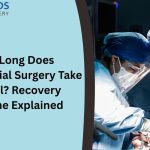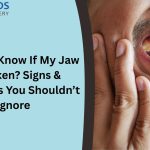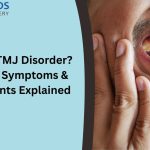Facial injuries can be frightening, and one of the most common yet often misdiagnosed conditions is a fractured jaw. Whether caused by trauma, accidents, sports injuries, or falls, jaw fractures need prompt medical attention to prevent long-term complications. Patients frequently ask me, “What are the symptoms of a fractured jaw?” Understanding the warning signs early can help you seek timely treatment and avoid irreversible damage.
As a leading maxillofacial surgeon specializing in TMJ treatment in Hyderabad, I’ve treated hundreds of patients with jaw trauma. In this guide, I’ll break down the top cracked jaw symptoms, explain diagnostic procedures, and help you recognize when to seek emergency care.
What is a Fractured Jaw?
A fractured jaw, medically termed a mandibular fracture, refers to a break or crack in the lower jawbone. It is the third most common facial bone fracture, after nasal and cheekbone fractures. These injuries may affect the dental alignment, bite, and temporomandibular joint (TMJ).
Prompt recognition of fracture jaw symptoms is vital to avoid misalignment, chronic pain, or nerve damage.

Top Symptoms of a Fractured Jaw
1. Pain in the Jawline or Face
Pain while chewing, speaking, or even at rest is one of the most prominent symptoms of a fractured jaw. The pain may be sharp, dull, or throbbing and typically worsens with jaw movement.
2. Swelling and Bruising
Swelling in the jaw, cheeks, or neck area is a telltale cracked jaw symptom. Bruising may appear along the jawline, under the ear, or near the chin. Internal bleeding in the tissue can cause facial asymmetry.
3. Difficulty Opening or Closing the Mouth
Patients often report “lockjaw” or a clicking sensation when trying to move the jaw. Restricted movement is one of the most serious fracture jaw symptoms, and it may indicate TMJ involvement.
4. Misaligned Bite
Another key symptom of fractured jaw is malocclusion, or the inability of the upper and lower teeth to meet properly. This can happen if the bone has shifted or is cracked near the joint.
5. Loose or Damaged Teeth
In many jaw fractures, nearby teeth may be knocked out, loosened, or fractured. Dental issues often go hand-in-hand with jaw trauma.
6. Numbness or Tingling
Damage to the nerves in the lower jaw can cause numbness in the chin, lips, or lower face. If this is present, it’s an urgent cracked jaw symptom.
7. Audible Clicking or Popping Sounds
A fractured jaw may cause clicking or grinding sounds when moving the jaw. This can be subtle but should never be ignored, especially with other signs present.
Less Common Symptoms to Watch
- Headaches and ear pain
- Difficulty swallowing
- Excessive drooling
- Change in speech tone
- Neck stiffness or pain
Even subtle or delayed signs should prompt a visit to a facial trauma specialist, especially if you’ve experienced facial injury.
Risk Factors for Jaw Fractures
Fractured jaws often result from:
- Road traffic accidents
- Falls from height
- Physical assault
- Sports injuries (boxing, rugby, etc.)
- Industrial or workplace trauma
Individuals with osteoporosis or bone cancer are also at increased risk of symptoms of a fractured jaw even from minor injuries.
Diagnostic Procedures
When a patient presents with potential cracked jaw symptoms, we perform:
- Clinical Examination: To check for bite irregularities, swelling, or deformities
- X-rays: Panoramic or lateral views to detect fractures
- CT Scans: High-resolution imaging for detailed assessment
- 3D Planning: Used for complex fractures and surgical planning
At our center for TMJ treatment in Hyderabad, we use 3D diagnostic tools to enhance accuracy and plan minimally invasive treatments.
Treatment Options for Fractured Jaws
Treatment depends on the severity and location of the fracture:
1. Non-Surgical Treatment
- Soft diet for minor cracks
- Anti-inflammatory medications
- Jaw immobilization using banding or splints
2. Surgical Intervention
- Open reduction and internal fixation (ORIF)
- Plate and screw fixation
- Jaw wiring for immobilization
Recovery typically takes 4–6 weeks, but follow-up is crucial to monitor healing and dental alignment.
Complications if Left Untreated
Ignoring fracture jaw symptoms may lead to:
- Chronic TMJ dysfunction
- Facial asymmetry
- Permanent nerve damage
- Malocclusion
- Infections or abscesses
When to See a Specialist
If you notice any of the following, seek immediate evaluation:
- Severe facial pain after trauma
- Mouth won’t open or close properly
- Visible jaw deformity
- Persistent swelling and bruising
Consulting a maxillofacial expert like Dr. Suresh ensures proper treatment planning and long-term recovery.
Prevention Tips
- Wear seatbelts and helmets
- Use mouthguards during contact sports
- Avoid altercations or risky activities
- Maintain bone health through calcium-rich diets
Final Word: Don’t Ignore the Signs
Recognizing the symptoms of a fractured jaw early can make the difference between a short recovery and chronic complications. If you suspect a jaw fracture, don’t delay—get a professional evaluation.












